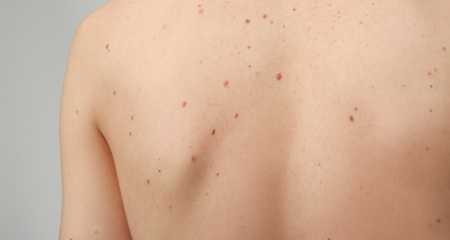
While many of us may overlook those small dark spots known as moles, their presence, especially when changed or newly developed, can be crucial for your skin health. At Northstar Dermatology in Southlake, TX, our board-certified dermatologists emphasize the importance of regular mole checks to prevent potential health hazards like melanoma, the deadliest skin cancer form. Whether you’re keen on enhancing your aesthetic appeal or you’re apprehensive about a mole’s sudden change, we’re here to assist. Simply call our office or book your appointment online.
Moles are clusters of melanocytes, or pigmented cells, that form as growths on the skin. They are very common, with most people having at least a few, and they can range in color from skin-toned to shades of pink, blue, brown, or black. Moles typically begin to appear in childhood and may grow during adolescence. However, if a new mole appears in adulthood, it could be a potential sign of melanoma and should be assessed by a board-certified dermatologist.
Regular skin exams by a board-certified dermatologist can help identify signs of Melanoma. You can also perform self-skin-checks to look for the warning signs of melanoma. Check your moles for the following:
If a mole exhibits any of these traits, or has signs of bleeding or discomfort, be sure to request a Skin Cancer Screening with a specialist at Northstar Dermatology
If a mole shows signs of abnormality or potential skin cancer during an exam, a biopsy may be advised. The area will be numbed, and a thin blade will be used to gently remove surface tissue from the mole, which will then be sent to a pathology lab for analysis. The pathologist will closely examine the microscopic features of the tissue to determine the exact diagnosis or extent of any abnormality. If skin cancer is detected, further treatment, such as excision, may be recommended to ensure complete removal of any remaining cancerous cells.
Some moles with atypical characteristics may also be recommended for excision to reduce the risk of developing melanoma, while others with milder features may simply be monitored.
Board-certified dermatologists are expertly trained to assess mole characteristics and can use a dermatoscope to closely inspect tissue details. For any new or changing moles, schedule an evaluation with Northstar Dermatology’s skilled dermatologists.